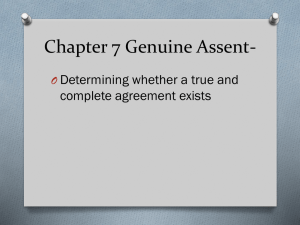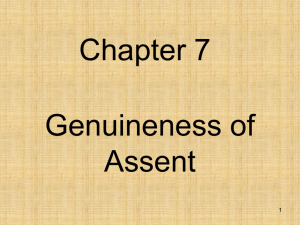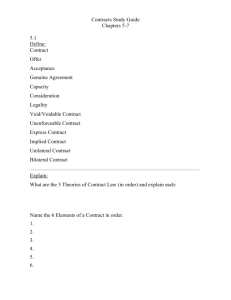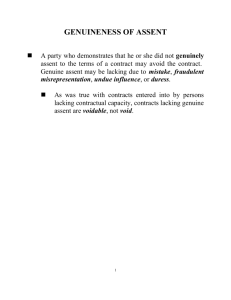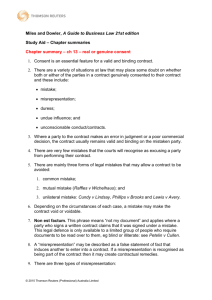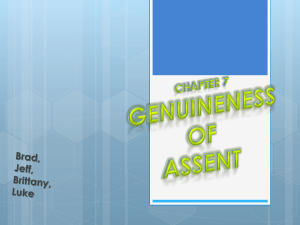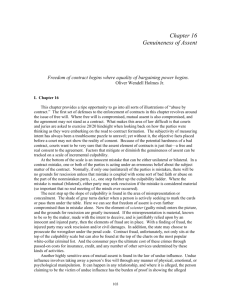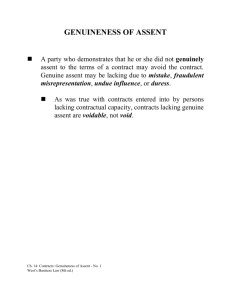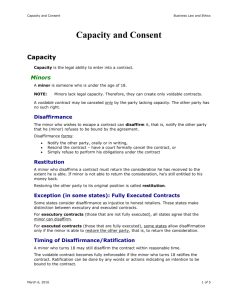GENUINENESS OF ASSENT
advertisement
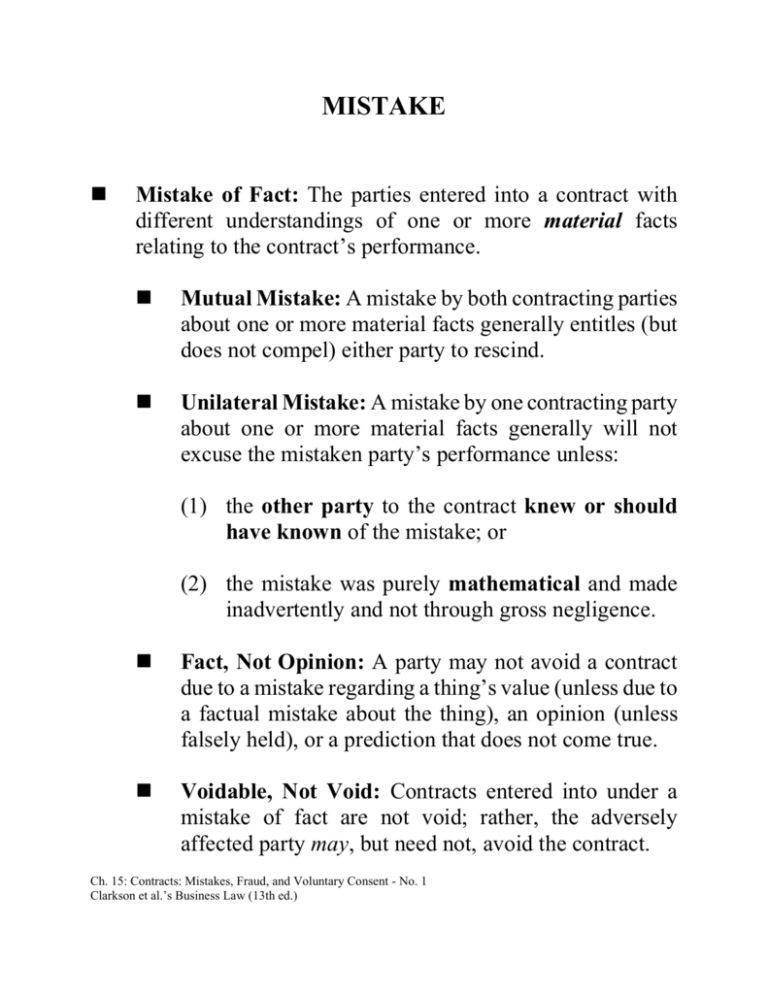
MISTAKE Mistake of Fact: The parties entered into a contract with different understandings of one or more material facts relating to the contract’s performance. Mutual Mistake: A mistake by both contracting parties about one or more material facts generally entitles (but does not compel) either party to rescind. Unilateral Mistake: A mistake by one contracting party about one or more material facts generally will not excuse the mistaken party’s performance unless: (1) the other party to the contract knew or should have known of the mistake; or (2) the mistake was purely mathematical and made inadvertently and not through gross negligence. Fact, Not Opinion: A party may not avoid a contract due to a mistake regarding a thing’s value (unless due to a factual mistake about the thing), an opinion (unless falsely held), or a prediction that does not come true. Voidable, Not Void: Contracts entered into under a mistake of fact are not void; rather, the adversely affected party may, but need not, avoid the contract. Ch. 15: Contracts: Mistakes, Fraud, and Voluntary Consent - No. 1 Clarkson et al.’s Business Law (13th ed.) MATERIAL MISREPRESENTATION Fraudulent Misrepresentation: An innocent party induced to enter into a contract by a misrepresentation of material fact may avoid the contract because she did not genuinely assent. In order to do so, she must establish that the other party (1) knowingly, or with reckless disregard for the truth, and (2) with the intent to deceive the innocent party, (3) misstated or omitted a material fact on which (a) a reasonable person would rely in deciding whether and on what terms to enter into the contract and (b) the innocent party did rely to her detriment. Negligent Misrepresentation: A material misrepresentation made without knowledge of or reckless disregard for its falsehood and without intent to deceive. Ch. 15: Contracts: Mistakes, Fraud, and Voluntary Consent - No. 2 Clarkson et al.’s Business Law (13th ed.) TYPES OF MISREPRESENTATION Predictions and Expressions of Opinion: Generally, these will not excuse the innocent party, unless the person making the prediction or stating the opinion (1) has superior knowledge of the subject matter and knows or has reason to know that the innocent party intends to rely on the statement; or (2) disbelieves the prediction or does not genuinely hold the stated opinion. Misrepresentation by Conduct: The conduct of a party – particularly a party’s concealment of some material fact from the other party – will support an excuse of misrepresentation. Misrepresentation of Law: Generally, this will not excuse the innocent party, unless the speaker is a judge, legislator, or attorney, or otherwise a member of a profession that requires greater knowledge of the law than possessed by the average citizen. Misrepresentation by Silence: Generally, neither party to a contract has a duty to come forward and volunteer facts unless the other party asks. However, common and statutory law create a duty to speak in certain situations (e.g., where one is aware of a serious defect or serious risk of injury). Ch. 15: Contracts: Mistakes, Fraud, and Voluntary Consent - No. 3 Clarkson et al.’s Business Law (13th ed.) INTENT, RELIANCE, AND INJURY Scienter: A defendant acts with the intent to deceive if he: (1) knows a statement to be false, (2) makes a statement he reasonably believes to false, (3) makes a statement recklessly, without regard to its truthfulness or falsity, or (4) implies that he bases the statement on information or expertise on which it is not, in fact, based. Justifiable Reliance: The innocent party must have acted based on (although not solely based on) the misrepresentation; and she must have had a justifiable reason for doing so. Injury: Most courts do not require the innocent party to prove an injury in order to rescind the contract (returning the parties to their pre-contractual positions). However, if the innocent party seeks to recover damages, she must prove that the misrepresentation caused her economic harm. Ch. 15: Contracts: Mistakes, Fraud, and Voluntary Consent - No. 4 Clarkson et al.’s Business Law (13th ed.) UNDUE INFLUENCE AND DURESS Undue Influence arises from relationships in which one party can influence another party to the point of overcoming the influenced party’s free will. The essential feature of undue influence is that the party being influenced does not genuinely assent of her own free will. If a contract enriches a party at the expense of another whom the enriched party dominates or to whom the enriched party owes fiduciary duties, courts will often presume undue influence. Undue influence is grounds for rescinding (or canceling) the contract. Duress: Compelling an innocent party to enter into a contract by threatening to harm him or another person, or his livelihood, if he does not agree to the contract. Duress is grounds for rescission; although, a party forced to enter into a contract under duress may choose to perform the contract. Ch. 15: Contracts: Mistakes, Fraud, and Voluntary Consent - No. 5 Clarkson et al.’s Business Law (13th ed.) ADHESION CONTRACTS AND UNCONSCIONABILITY (REDUX) Adhesion Contract: A contract written exclusively by one party (the “dominant” party, usually the seller or creditor) and presented to the other party (the “adhering” party, usually the buyer or borrower) on a “take-it-or-leave-it” basis, such that the adhering party has no opportunity to negotiate the terms of the contract. To avoid enforcement of a contract based on adhesion, the adhering party must show that: (1) the parties had substantially unequal bargaining positions, and (2) enforcement against the adhering party would be manifestly unfair or oppressive. Unconscionability: A court may invalidate a clause or an entire contract if the court finds the clause or contract to be substantively unconscionable, the product of procedural unconscionability, or both. Ch. 15: Contracts: Mistakes, Fraud, and Voluntary Consent - No. 6 Clarkson et al.’s Business Law (13th ed.)
